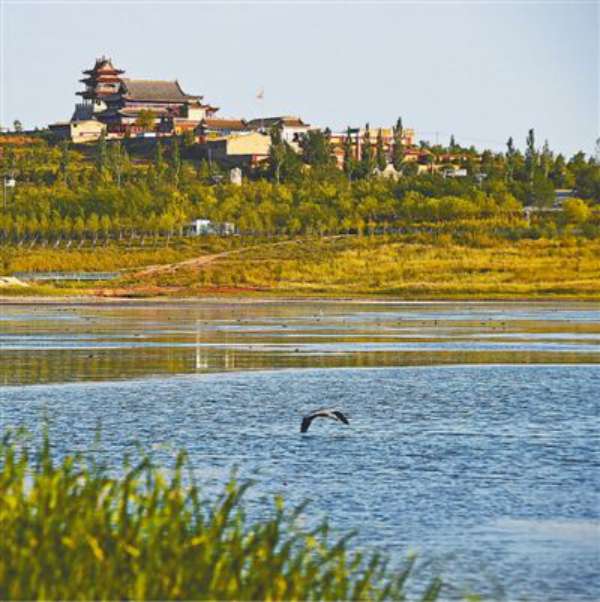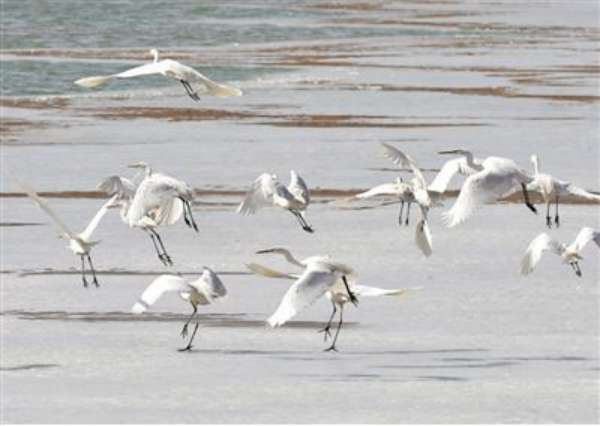

In recent years, with China's continued investment in compensation of wetland ecological benefits, coupled with persistent ecological restoration, the ecological environment in Yanchi of northwest China's Ningxia Hui Autonomous Region has been fundamentally improved.
With desertification reversed, and the number of plants and animals gradually increasing, Yanchi is looking like a better and better place.

The Huamasi national forest park. (Photo via Haba Lake Nature Reserve)
The Haba Lake Nature Reserve in Yanchi is a desert steppe - wetland ecosystem reserve. Up until not too long ago, it was covered by yellow sands. However, over the past more than 40 years, through persistent ecological restoration efforts, today, green plants are popping up little by little.
The State Council approved the establishment of the Haba Lake Nature Reserve in February 2006. The total area of the reserve is 84,000 hectares, including wetland and desert ecosystems.
This ecological barrier helps block the south encroachment of the Mu Us Sandland.

(Photo via Haba Lake Nature Reserve)
"The annual precipitation here is less than 300 millimeters, yet the annual evaporation is eight times the precipitation. The precious wetlands are the main habitat and breeding ground for wild animals in the reserve, as well as an important station for migratory birds," said Wu Hong, director of Haba Lake Nature Reserve Administration.
Wetland restoration is a systematic process. The main reason for the formation of wetlands is rich groundwater resources and special geological structure, and the surface vegetation is crucial to maintain the balance of wetland ecosystems, according to the staff of the reserve.
In recent years, the reserve has made every effort to prevent human activities from eating up the wetland area, especially to prevent villagers from reclaiming wasteland around the wetland, which will affect the habitat and migration of birds and wildlife.
"Since 2014, Haba Lake Nature Reserve has been listed as a pilot project of national wetland ecological benefit compensation, which plays a great role in the ecological restoration of wetlands in the reserve," Wu Hong pointed out.
Between 2014 and 2019, Haba Lake Nature Reserve received 125 million yuan (about $18 million) in compensation for the ecological benefits of the central wetland, Wu Hong said.
A piece of farmland that was about 910,000 mu (about 60,666 hectares) damaged by bird and other wildlife activities was compensated, with compensation of about 45 million yuan, benefiting 8,152 households in the region.
 Fire brigade in Shanghai holds group wedding
Fire brigade in Shanghai holds group wedding Tourists enjoy ice sculptures in Datan Town, north China
Tourists enjoy ice sculptures in Datan Town, north China Sunset scenery of Dayan Pagoda in Xi'an
Sunset scenery of Dayan Pagoda in Xi'an Tourists have fun at scenic spot in Nanlong Town, NW China
Tourists have fun at scenic spot in Nanlong Town, NW China Harbin attracts tourists by making best use of ice in winter
Harbin attracts tourists by making best use of ice in winter In pics: FIS Alpine Ski Women's World Cup Slalom
In pics: FIS Alpine Ski Women's World Cup Slalom Black-necked cranes rest at reservoir in Lhunzhub County, Lhasa
Black-necked cranes rest at reservoir in Lhunzhub County, Lhasa China's FAST telescope will be available to foreign scientists in April
China's FAST telescope will be available to foreign scientists in April "She power" plays indispensable role in poverty alleviation
"She power" plays indispensable role in poverty alleviation Top 10 world news events of People's Daily in 2020
Top 10 world news events of People's Daily in 2020 Top 10 China news events of People's Daily in 2020
Top 10 China news events of People's Daily in 2020 Top 10 media buzzwords of 2020
Top 10 media buzzwords of 2020 Year-ender:10 major tourism stories of 2020
Year-ender:10 major tourism stories of 2020 No interference in Venezuelan issues
No interference in Venezuelan issues
 Biz prepares for trade spat
Biz prepares for trade spat
 Broadcasting Continent
Broadcasting Continent Australia wins Chinese CEOs as US loses
Australia wins Chinese CEOs as US loses